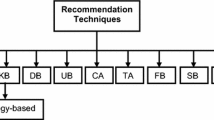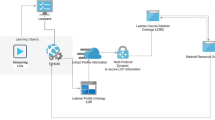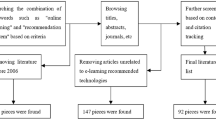Abstract
An e-learning recommender system (RS) aims to generate personalized recommendations based on learner preferences and goals. The existing RSs in the e-learning domain still exhibit drawbacks due to its inability to consider the learner characteristics in the recommendation process. In this paper, we are dealing with the new user cold-start problem, which is a major drawback in e-learning content RSs. This problem can be mitigated by incorporating additional learner data in the recommendation process. This paper proposes an ontology-based (OB) content recommender system for addressing the new user cold-start problem. In the proposed recommendation model, ontology is used to model the learner and learning objects with their characteristics. Collaborative and content-based filtering techniques are used in the recommendation model to generate the top N recommendations based on learner ratings. Experiments were conducted to evaluate the performance and prediction accuracy of the proposed model in cold-start conditions using the evaluation metrics mean absolute error, precision and recall. The proposed model provides more reliable and personalized recommendations by making use of ontological domain knowledge.







Similar content being viewed by others
Data availability
The datasets used and/or analyzed during the current study are available from the authors on reasonable request.
References
Adomavicius, G., & Kwon, Y. (2007). New recommendation techniques for multicriteria rating systems. IEEE Intelligent Systems, 22(3), 48–55.
Aeiad, E., & Meziane, F. (2019). An adaptable and personalised E-learning system applied to computer science programmes design. Education and Information Technologies, 24(2), 1485–1509.
Al-Yahya, M., George, R., & Alfaries, A. (2015). Ontologies in e-learning: Review of the literature. International Journal of Software Engineering and its Applications, 9(2), 67–84.
Atif, Y., Benlamri, R., & Berri, J. (2003). Learning objects based framework for self-adaptive learning. Education and Information Technologies, 8(4), 345–368.
Bahmani, A., Sedigh, S., & Hurson, A. (2012). Ontology-based recommendation algorithms for personalized education. In International Conference on Database and Expert Systems Applications (pp. 111–120). Springer.
Bajenaru, L., Borozan, A. M., & Smeureanu, I. (2015). Using ontologies for the e-learning system in healthcare human resources management. InformaticaEconomica, 19(2), 15.
Barjasteh, I., Forsati, R., Ross, D., Esfahanian, A. H., & Radha, H. (2016). Cold-start recommendation with provable guarantees: A decoupled approach. IEEE Transactions on Knowledge and Data Engineering, 28(6), 1462–1474.
Barragáns-Martínez, A. B., Costa-Montenegro, E., Burguillo, J. C., Rey-López, M., Mikic-Fonte, F. A., & Peleteiro, A. (2010). A hybrid content-based and item-based collaborative filtering approach to recommend TV programs enhanced with singular value decomposition. Information Sciences, 180(22), 4290–4311.
Benhamdi, S., Babouri, A., & Chiky, R. (2017). Personalized recommender system for e-learning environment. Education and Information Technologies, 22(4), 1455–1477.
Bhaskaran, S., & Santhi, B. (2019). An efficient personalized trust based hybrid recommendation (tbhr) strategy for e-learning system in cloud computing. Cluster Computing, 22(1), 1137–1149.
Bobadilla, J., Ortega, F., Hernando, A., & Gutiérrez, A. (2013). Recommender systems survey. Knowledge-Based Systems, 46, 109–132.
Bouihi, B., & Bahaj, M. (2017). An ontology-based architecture for context recommendation system in E-learning and mobile-learning applications. In 2017 International Conference on Electrical and Information Technologies (ICEIT) (pp. 1–6). IEEE.
Bourkoukou, O., & El Bachari, E. (2016). E-learning personalization based on collaborative filtering and learner’s preference. Journal of Engineering Science and Technology, 11(11), 1565–1581.
Bourkoukou, O., El Bachari, E., & El Adnani, M. (2017). A recommender model in e-learning environment. Arabian Journal for Science and Engineering, 42(2), 607–617.
Buder, J., & Schwind, C. (2012). Learning with personalized recommender systems: A psychological view. Computers in Human Behavior, 28(1), 207–216.
Buitrago, M., & Chiappe, A. (2019). Representation of knowledge in digital educational environments: A systematic review of literature. Australasian Journal of Educational Technology, 35(4).
Burke, R. (2007). Hybrid web recommender systems. In The adaptive web (pp. 377–408). Springer.
Cakula, S., & Sedleniece, M. (2013). Development of a personalized e-learning model using methods of ontology. Procedia Computer Science, 26, 113–120.
Chen, H., Cui, X., & Jin, H. (2016). Top-k followee recommendation over microblogging systems by exploiting diverse information sources. Future Generation Computer Systems, 55, 534–543.
Chen, W., Niu, Z., Zhao, X., & Li, Y. (2014). A hybrid recommendation algorithm adapted in e-learning environments. World Wide Web, 17(2), 271–284.
Ciloglugil, B., & Inceoglu, M. M. (2016). Ontology usage in e-learning systems focusing on metadata modeling of learning objects. In International Conference on New Trends in Education, ICNTE, pp. 80–96.
Deschênes, M. (2020). Recommender systems to support learners' agency in a learning context: A systematic review. International Journal of Educational Technology in Higher Education, 17(1), 1–23.
Dwivedi, P., & Bharadwaj, K. K. (2013). Effective trust-aware e-learning recommender system based on learning styles and knowledge levels. Journal of Educational Technology & Society, 16(4), 201–216.
Dwivedi, P., Kant, V., & Bharadwaj, K. K. (2018). Learning path recommendation based on modified variable length genetic algorithm. Education and Information Technologies, 23(2), 819–836.
Essalmi, F., Ayed, L. J. B., Jemni, M., & Graf, S. (2010). A fully personalization strategy of e-learning scenarios. Computers in Human Behavior, 26(4), 581–591.
Felder, R. M., & Silverman, L. K. (1988). Learning and teaching styles in engineering education. Engineering Education, 78(7), 674–681.
Fraihat, S., & Shambour, Q. (2015). A framework of semantic recommender system for e-learning. Journal of Software, 10(3), 317–330.
George, G., & Lal, A. M. (2019). Review of ontology-based recommender systems in e-learning. Computers & Education, 142, 103642.
Graf, S., & Kinshuk, K. (2007). Providing adaptive courses in learning management systems with respect to learning styles. In E-Learn: World Conference on E-Learning in Corporate, Government, Healthcare, and Higher Education (pp. 2576–2583). Association for the Advancement of Computing in Education.
Graf, S., Viola, S. R., Leo, T., & Kinshuk. (2007). In-depth analysis of the felder-silverman learning style dimensions. Journal of Research on Technology in Education, 40(1), 79–93.
Gruber, T. R. (1993). A translation approach to portable ontology specifications. Knowledge Acquisition, 5(2), 199–221.
Harrathi, M., Touzani, N., & Braham, R. (2017). A hybrid knowlegde-based approach for recommending massive learning activities. In 2017 IEEE/ACS 14th International Conference on Computer Systems and Applications (AICCSA) (pp. 49–54). IEEE.
Holzinger, A., Smolle, J., & Reibnegger, G. (2006). An object-oriented approach to manage e-learning content using learning objects. In Handbook of research on informatics in healthcare and biomedicine (pp. 89–98).
IEEE-LTSC. (2010). IEEE P1484.12.1–2002/Cor 1/D14. Draft standard for learning object metadata — corrigendum 1: corrigenda for 1484.12.1 LOM (learning object metadata), IEEE Learning Technology Standards Committee.
Jannach, D., Zanker, M., Felfernig, A., & Friedrich, G. (2010). Recommender systems: An introduction. Cambridge University Press.
Joy, J., Raj, N. S. & Renumol V.G. (2019). An ontology model for content recommendation in personalized learning environment. In Proceedings of the Second International Conference on Data Science, E-Learning and Information Systems (pp. 1–6). ACM.
Kamal, A., & Radhakrishnan, S. (2019). Individual learning preferences based on personality traits in an e-learning scenario. Education and Information Technologies, 24(1), 407–435.
Karga, S., & Satratzemi, M. (2018). A hybrid recommender system integrated into LAMS for learning designers. Education and Information Technologies, 23(3), 1297–1329.
Khanal, S. S., Prasad, P. W. C., Alsadoon, A., & Maag, A. (2019). A systematic review: Machine learning based recommendation systems for e-learning. Education and Information Technologies, 25(4), 2635–2664.
Kilani, Y., Alhijawi, B., & Alsarhan, A. (2018). Using artificial intelligence techniques in collaborative filtering recommender systems: Survey. International Journal of Advanced Intelligence Paradigms, 11(3–4), 378–396.
Kim, S. C., Sung, K. J., Park, C. S., & Kim, S. K. (2016). Improvement of collaborative filtering using rating normalization. Multimedia Tools and Applications, 75(9), 4957–4968.
Klašnja-Milićević, A., Vesin, B., Ivanović, M., & Budimac, Z. (2011). E-learning personalization based on hybrid recommendation strategy and learning style identification. Computers & Education, 56(3), 885–899.
Klašnja-Milićević, A., Ivanović, M., & Nanopoulos, A. (2015). Recommender systems in e-learning environments: A survey of the state-of-the-art and possible extensions. Artificial Intelligence Review, 44(4), 571–604.
Klašnja-Milićević, A., Ivanović, M., Vesin, B., & Budimac, Z. (2018). Enhancing e-learning systems with personalized recommendation based on collaborative tagging techniques. Applied Intelligence, 48(6), 1519–1535.
Kolekar, S. V., Pai, R. M., & ManoharaPai, M. M. (2019). Rule based adaptive user interface for adaptive e-learning system. Education and Information Technologies, 24(1), 613–641.
Lam, X. N., Vu, T., Le, T. D., & Duong, A. D. (2008). Addressing cold-start problem in recommendation systems. In Proceedings of the 2nd international conference on Ubiquitous information management and communication (pp. 208–211).
Lika, B., Kolomvatsos, K., & Hadjiefthymiades, S. (2014). Facing the cold start problem in recommender systems. Expert Systems with Applications, 41(4), 2065–2073.
Manouselis, N., Drachsler, H., Vuorikari, R., Hummel, H., & Koper, R. (2011). Recommender systems in technology enhanced learning. In Recommender systems handbook (pp. 387–415). Springer.
Mobasher, B. (2007). Data mining for web personalization. In The adaptive web (pp. 90–135). Springer.
Murad, D. F., Heryadi, Y., Isa, S. M., & Budiharto, W. (2020). Personalization of study material based on predicted final grades using multi-criteria user-collaborative filtering recommender system. Education and Information Technologies, 25, 5655–5668.
Nafea, S., Maglaras, L. A., Iewe, F., Smith, R., & Janicke, H. (2016). Personalized students’ profile based on ontology and rule-based reasoning. EAI Endorsed Transactions on E-Learning, 3(12), 151720.
Nafea, S. M., Siewe, F., & He, Y. (2019). On recommendation of learning objects using felder-silverman learning style model. IEEE Access, 7, 163034–163048.
Najafabadi, M. K., & Mahrin, M. N. R. (2016). A systematic literature review on the state of research and practice of collaborative filtering technique and implicit feedback. Artificial intelligence review, 45(2), 167–201.
Natarajan, S., Vairavasundaram, S., Natarajan, S., & Gandomi, A. H. (2020). Resolving data sparsity and cold start problem in collaborative filtering recommender system using linked open data. Expert Systems with Applications, 149, 113248.
Ouf, S., Ellatif, M. A., Salama, S. E., & Helmy, Y. (2017). A proposed paradigm for smart learning environment based on semantic web. Computers in Human Behavior, 72, 796–818.
Park, S. T., Pennock, D., Madani, O., Good, N., & DeCoste, D. (2006). Naïve filterbots for robust cold-start recommendations. In Proceedings of the 12th ACM SIGKDD international conference on Knowledge discovery and data mining (pp. 699–705).
Pazzani, M. J., & Billsus, D. (2007). Content-based recommendation systems. In The adaptive web (pp. 325–341). Springer.
Premlatha, K. R., & Geetha, T. V. (2015). Learning content design and learner adaptation for adaptive e-learning environment: a survey. Artificial Intelligence Review, 44(4), 443–465.
Pukkhem, N. (2013). Ontology-based semantic approach for learning object recommendation. International Journal on Information Technology, 3(4), 12.
Pukkhem, N. (2014). LORecommendNet: an ontology-based representation of learning object recommendation. In Recent Advances in Information and Communication Technology (pp. 293–303). Springer.
Raju, P., & Ahmed, V. (2012). Enabling technologies for developing next-generation learning object repository for construction. Automation in Construction, 22, 247–257.
Ranjbar, M., Moradi, P., Azami, M., & Jalili, M. (2015). An imputation-based matrix factorization method for improving accuracy of collaborative filtering systems. Engineering Applications of Artificial Intelligence, 46, 58–66.
Ricci, F., Rokach, L., & Shapira, B. (2011). Introduction to recommender systems handbook. In Recommender systems handbook (pp. 1–35). Springer.
Romero, L., Saucedo, C., Caliusco, M. L., & Gutiérrez, M. (2019). Supporting self-regulated learning and personalization using ePortfolios: a semantic approach based on learning paths. International Journal of Educational Technology in Higher Education, 16(1), 16.
Ruiz-Iniesta, A., Jimenez-Diaz, G., & Gomez-Albarran, M. (2014). A semantically enriched context-aware OER recommendation strategy and its application to a computer science OER repository. IEEE Transactions on Education, 57(4), 255–260.
Safoury, L., & Salah, A. (2013). Exploiting user demographic attributes for solving cold-start problem in recommender system. Lecture Notes on Software Engineering, 1(3), 303–307.
Saleena, B., & Srivatsa, S. K. (2015). Using concept similarity in cross ontology for adaptive e-learning systems. Journal of King Saud University-Computer and Information Sciences, 27(1), 1–12.
Salehi, M., Kamalabadi, I. N., & Ghoushchi, M. B. G. (2013). An effective recommendation framework for personal learning environments using a learner preference tree and a GA. IEEE Transactions on Learning Technologies, 6(4), 350–363.
Sarwar, B., Karypis, G., Konstan, J., & Riedl, J. (2001). Item-based collaborative filtering recommendation algorithms. In Proceedings of the 10th international conference on World Wide Web (pp. 285–295).
Schafer, J. B., Frankowski, D., Herlocker, J., & Sen, S. (2007). Collaborative filtering recommender systems. In The adaptive web (pp. 291–324). Springer.
Schein, A. I., Popescul, A., Ungar, L. H., & Pennock, D. M. (2002). Methods and metrics for cold-start recommendations. In Proceedings of the 25th annual international ACM SIGIR conference on research and development in information retrievaz (pp. 253–260).
Senthilnayaki, B., Venkatalakshmi, K., & Kannan, A. (2015). An ontology based framework for intelligent web based e-learning. International Journal of Intelligent Information Technologies (IJIIT), 11(2), 23–39.
Shani, G., & Gunawardana, A. (2011). Evaluating recommendation systems. In Recommender systems handbook (pp. 257–297). Springer.
Shaw, G., Xu, Y., & Geva, S. (2010). Using association rules to solve the cold-start problem in recommender systems. In Pacific-Asia conference on knowledge discovery and data mining (pp. 340–347). Springer.
Sheeba, T., & Krishnan, R. (2016). An ontological framework of semantic learner profile in an e-learning system. International Conference on Brain Inspired Cognitive Systems. (pp. 284–297). Springer.
Shishehchi, S., Banihashem, S. Y., Zin, N. A. M., Noah, S. A. M., & Malaysia, K. (2012). Ontological approach in knowledge based recommender system to develop the quality of e-learning system. Australian Journal of Basic and Applied Sciences, 6(2), 115–123.
Silva, N., Carvalho, D., Pereira, A. C., Mourão, F., & Rocha, L. (2019). The pure cold-start problem: A deep study about how to conquer first-time users in recommendations domains. Information Systems, 80, 1–12.
Soloman, B. A., & Felder, R. M. (2005). Index of learning styles questionnaire. NC State University. Available online at: http://www.engr.ncsu.edu/learningstyles/ilsweb.html. Accessed 14 May 2010, 70.
Son, L. H. (2016). Dealing with the new user cold-start problem in recommender systems: A comparative review. Information Systems, 58, 87–104.
Sosnovsky, S., Hsiao, I. H., & Brusilovsky, P. (2012). Adaptation “in the Wild”: ontology-based personalization of open-corpus learning material. European Conference on Technology Enhanced Learning. (pp. 425–431). Springer.
Tarus, J. K., Niu, Z., & Yousif, A. (2017). A hybrid knowledge-based recommender system for e-learning based on ontology and sequential pattern mining. Future Generation Computer Systems, 72, 37–48.
Tarus, J. K., Niu, Z., & Mustafa, G. (2018). Knowledge-based recommendation: A review of ontology-based recommender systems for e-learning. Artificial intelligence review, 50(1), 21–48.
Vanitha, V., & Krishnan, P. (2019). A modified ant colony algorithm for personalized learning path construction. Journal of Intelligent & Fuzzy Systems, 37(5), 6785–6800.
Victor, P., De Cock, M., Cornelis, C., & Teredesai, A. M. (2008). Getting cold start users connected in a recommender system's trust network. In Computational Intelligence in Decision and Control (pp. 877–882).
Wiley, D. A. (2000). Connecting learning objects to instructional design theory: A definition, a metaphor, and a taxonomy. The instructional use of learning objects, 2830(435), 1–35.
Wongchokprasitti, C., Peltonen, J., Ruotsalo, T., Bandyopadhyay, P., Jacucci, G., & Brusilovsky, P. (2015). User model in a box: Cross-system user model transfer for resolving cold start problems. In International Conference on User Modeling, Adaptation, and Personalization (pp. 289–301). Springer.
Yang, S. Y. (2010). Developing an ontology-supported information integration and recommendation system for scholars. Expert Systems with Applications, 37(10), 7065–7079.
Yao, L., Sheng, Q. Z., Ngu, A. H., Yu, J., & Segev, A. (2014). Unified collaborative and content-based web service recommendation. IEEE Transactions on Services Computing, 8(3), 453–466.
Zhang, Z. K., Liu, C., Zhang, Y. C., & Zhou, T. (2010). Solving the cold-start problem in recommender systems with social tags. EPL (Europhysics Letters), 92(2), 28002.
Zhao, X., Niu, Z., Chen, W., Shi, C., Niu, K., & Liu, D. (2015a). A hybrid approach of topic model and matrix factorization based on two-step recommendation framework. Journal of Intelligent Information Systems, 44(3), 335–353.
Zhao, X., Niu, Z., Wang, K., Niu, K., & Liu, Z. (2015b). Improving top-N recommendation performance using missing data. Mathematical Problems in Engineering, 2015.
Zhong, J., Xie, H. & Wang, F.L. (2019). The research trends in recommender systems for e-learning: A systematic review of SSCI journal articles from 2014 to 2018. Asian Association of Open Universities Journal, 14(1), 12–27.
Zhuhadar, L., & Nasraoui, O. (2010). A hybrid recommender system guided by semantic user profiles for search in the e-learning domain. Journal of Emerging Technologies in Web Intelligence, 2(4), 272–281.
Author information
Authors and Affiliations
Corresponding author
Additional information
Publisher's note
Springer Nature remains neutral with regard to jurisdictional claims in published maps and institutional affiliations.
Rights and permissions
About this article
Cite this article
Jeevamol, J., Renumol, V.G. An ontology-based hybrid e-learning content recommender system for alleviating the cold-start problem. Educ Inf Technol 26, 4993–5022 (2021). https://doi.org/10.1007/s10639-021-10508-0
Received:
Accepted:
Published:
Issue Date:
DOI: https://doi.org/10.1007/s10639-021-10508-0




